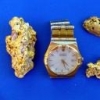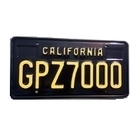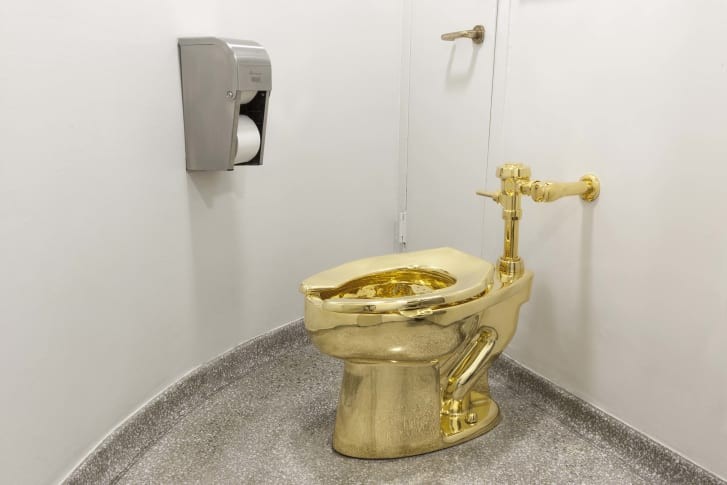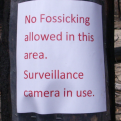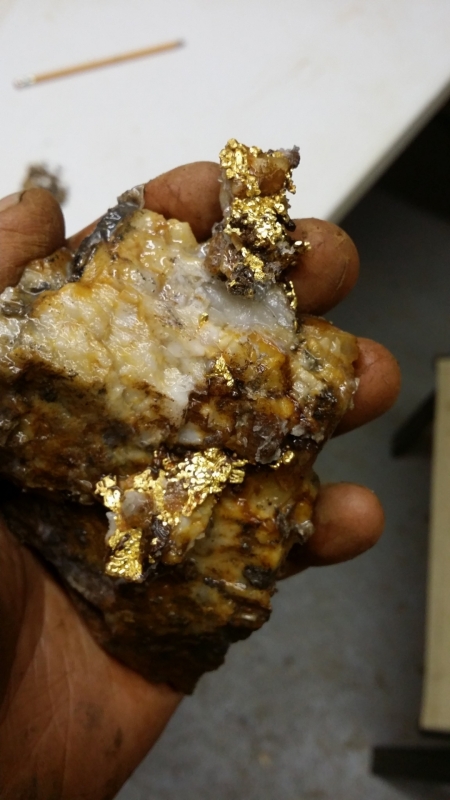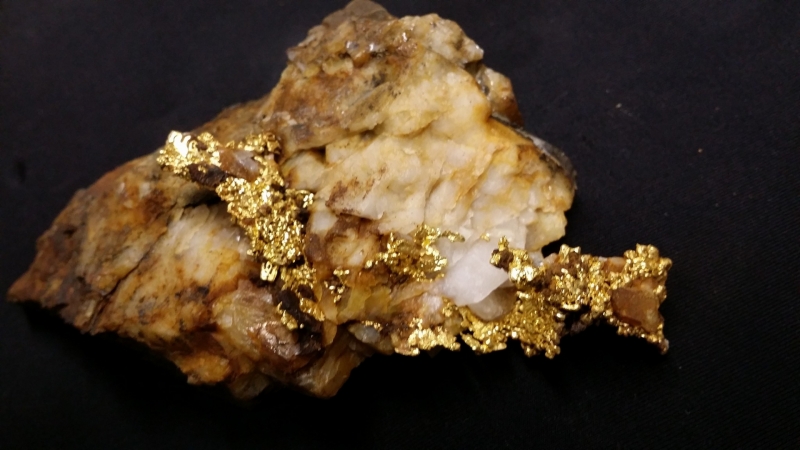Search the Community
Showing results for tags 'gold news'.
-
Mankind's attitude to gold is bizarre. Chemically, it is uninteresting - it barely reacts with any other element. Yet, of all the 118 elements in the periodic table, gold is the one we humans have always tended to choose to use as currency. Why? Why not osmium or chromium, or helium, say - or maybe seaborgium? That's where I meet Andrea Sella, a professor of chemistry at University College London, beside an exquisite breastplate of pure beaten gold. He pulls out a copy of the periodic table. "Some elements are pretty easy to dismiss," he tells me, gesturing to the right-hand side of the table. "Here you've got the noble gases and the halogens. A gas is never going to be much good as a currency. It isn't really going to be practical to carry around little phials of gas is it? "And then there's the fact that they are colorless. How on earth would you know what it is?" The two liquid elements (at everyday temperature and pressure) - mercury and bromine - would be impractical too. Both are also poisonous - not a good quality in something you plan to use as money. Similarly, we can cross out arsenic and several others. Sella now turns his attention to the left-hand side of the table. "We can rule out most of the elements here as well," he says confidently. "The alkaline metals and earths are just too reactive. Many people will remember from school dropping sodium or potassium into a dish of water. It fizzes around and goes pop - an explosive currency just isn't a good idea." A similar argument applies to another whole class of elements, the radioactive ones: you don't want your cash to give you cancer. Out go thorium, uranium and plutonium, along with a whole bestiary of synthetically-created elements - rutherfordium, seaborgium, ununpentium, and einsteinium - which only ever exist momentarily as part of a lab experiment, before radioactively decomposing. Then there's the group called "rare earths", most of which are actually less rare than gold. Unfortunately, they are chemically hard to distinguish from each other, so you would never know what you had in your pocket. This leaves us with the middle area of the periodic table, the "transition" and "post-transition" metals. This group of 49 elements includes some familiar names - iron, aluminum, copper, lead, silver. But examine them in detail and you realize almost all have serious drawbacks. We've got some very tough and durable elements on the left-hand side - titanium and zirconium, for example. The problem is they are very hard to smelt. You need to get your furnace up into the region of 1,000C before you can begin to extract these metals from their ores. That kind of specialist equipment wasn't available to ancient man. Aluminum is also hard to extract, and it's just too flimsy for coinage. Most of the others in the group aren't stable - they corrode if exposed to water or oxidize in the air. Take iron. In theory it looks quite a good prospect for currency. It is attractive and polishes up to a lovely sheen. The problem is rust: unless you keep it completely dry it is liable to corrode away. "A self-debasing currency is clearly not a good idea," says Sella. We can rule out lead and copper on the same basis. Both are liable to corrosion. Societies have made both into money but the currencies did not last, literally. So, what's left? Of the 118 elements we are now down to just eight contenders: platinum, palladium, rhodium, iridium, osmium and ruthenium, along with the old familiars, gold and silver. These are known as the noble metals, "noble" because they stand apart, barely reacting with the other elements. They are also all pretty rare, another important criterion for a currency. Even if iron didn't rust, it wouldn't make a good basis for money because there's just too much of it around. You would end up having to carry some very big coins about. With all the noble metals except silver and gold, you have the opposite problem. They are so rare that you would have to cast some very tiny coins, which you might easily lose. They are also very hard to extract. The melting point of platinum is 1,768C. That leaves just two elements - silver and gold. Both are scarce but not impossibly rare. Both also have a relatively low melting point, and are therefore easy to turn into coins, ingots or jewelry. Silver tarnishes - it reacts with minute amounts of Sulphur in the air. That's why we place particular value on gold. It turns out then, that the reason gold is precious is precisely that it is so chemically uninteresting. Gold's relative inertness means you can create an elaborate golden jaguar and be confident that 1,000 years later it can be found in a museum display case in central London, still in pristine condition. So what does this process of elemental elimination tell us about what makes a good currency? First off, it doesn't have to have any intrinsic value. A currency only has value because we, as a society, decide that it does. As we've seen, it also needs to be stable, portable and non-toxic. And it needs to be fairly rare - you might be surprised just how little gold there is in the world. If you were to collect together every earring, every gold sovereign, the tiny traces gold in every computer chip, every pre-Columbian statuette, and every wedding ring and melt it down, it's guesstimated that you'd be left with just one 20-metre cube, or thereabouts. But scarcity and stability aren't the whole story. Gold has one other quality that makes it the stand-out contender for currency in the periodic table. Gold is... golden. All the other metals in the periodic table are silvery-colored except for copper - and as we've already seen, copper corrodes, turning green when exposed to moist air. That makes gold very distinctive. "That's the other secret of gold's success as a currency," says Sella. "Gold is unbelievably beautiful."
-
........Gold from Space......
-
Wales has a bit more gold than they normally disclose. They talk about keeping it for those Royal Weddings and such. Here is some historic information about gold in UK. https://www.walesonline.co.uk/business/business-news/gold-wales-mines-welsh-alba-16715755
-
-
A sheet of gold has been created that is two atoms thick. It is called nanoseaweed because it is green. I'm sure some exists in nature and we can find it with the right detector, an elliptical coil, some proper coil control and just a little luck! https://interestingengineering.com/worlds-thinnest-gold-sheet-created-one-million-times-thinner-than-a-finger-nail After we find it are we going to have any complaints about dollying it up? 😁 Mitchel P.S. Let's not forget about detecting the trees! https://www.livetradingnews.com/gold-found-in-trees-in-western-australia-146859.html#.XUo82TfYrnE
-
Is this the largest gold coin minted? https://stream2.kitco.com/19_07_16_Perth_liferay.mp4
-
Trade that coil in for a dish? https://www.rt.com/business/462703-golden-asteroid-everyone-billionaire/amp/
-
Here's a interesting read. If this asteroid crashed on Earth, it could make everyone a billionaire and collapse the Earth's economy. Crazy! https://www.foxnews.com/science/nasa-headed-towards-giant-golden-asteroid-that-could-make-everyone-on-earth-a-billionaire
-
Looks like instability in the Persian Gulf has had one positive outcome with gold topping AU$2000 for the first time. Certainly will run higher but may need to consolidate first. Traders taking profits may also push it down:
-
I got the word that Jim Straight has passed away in recent days. I last saw and spoke with Jim a bit over a year ago. He spent several hours on both Saturday and Sunday in the ICMJ booth with me at the Pomona GPAA show. He was a good man and wrote many articles for the ICMJ. It is sad to see him go. Jim was a great pioneer in the world of metal detecting for gold. He was on site for a great many famous old gold finds with metal detectors. Yet ye was very tight lipped about those locations. A lot of great secrets passed with him. It was always great to chat with him as we traveled a lot of similar paths - we both graduated from the Mackay School of mines, but about 30 years apart. We both spent a lot of time prospecting around Randsberg, CA and the northern Nevada placers of Pershing and Humboldt counties. I will miss our talks, as will so many other prospectors.
-
Newmont bought Goldcorp. Ok. They are big and we are not so ?? They have to divest properties. https://www.reuters.com/article/us-goldcorp-m-a-newmont-mining/newmont-to-become-largest-gold-producer-with-10-billion-goldcorp-buy-idUSKCN1P80UM Mitchel
-
Here is an article that argues that peak gold has been seen from mining. https://www.coinworld.com/news/precious-metals/2018/07/world-moving-toward-no-gold-mining-options.html When you look at the coinworld pages you will see lots of other interesting gold articles if you like to read such things. Mitchel
-
“Australia’s all-time record annual gold production (314 tonnes) … might well be exceeded*,” said Dr Sandra Close, from mining consultancy* Surbiton. https://www.heraldsun.com.au/kids-news/australia-set-for-record-gold-haul-in-2018-as-mining-booms/news-story/0f985c566f657751313c4a5c590c0cc1
-
There are many nuggets for sale on August 18 but the feature nugget is the 40 ozt Lightning Bolt nugget from Victoria. https://fineart.ha.com/itm/nature-and-science/gold-nugget-lightning-bolt-victoria-australia/a/5387-72036.s?ic4=GalleryView-Thumbnail-071515 This is great eye candy from all over the world.
-
I was at the GPAA gold show in southern California (Pomona) recently and had the pleasure of having Jim Straight sit in with me in the ICMJ booth for some hours on both days. It was fun, though at 88 Jim is slowing down just a little. Otherwise, he is doing fine. Jim was not the oldest prospector at the show, Pete Pederson was there and he is 90. I hope I can hang in that long! For those who dont know, Jim is one of the early day metal detecting prospectors, I think he got involved in the 1970s or something like that. He is well known for the books on prospecting that he has written. Some of the members of the forum might like to know that he is still up and at it.
-
Hi all, some of you have known me for many years as Mlgdave, owner of Goldbay.com and now I also own The Colorado Quartz Gold mine in California and ramping back up to run and mine 140 and 180 feet underground. This week me and my partner worked an old stope and found and extracted a killer piece! (more to come) I am living at the mine full time and should have some good stories and finds for you guys over the next few months/years Mlgdave
- 14 replies
-
- 22
-

-

-
- california
- gold found
-
(and 1 more)
Tagged with:
-
I found this picture on a Russian web page. Has anyone seen this before? https://zolotodb.ru/gallery/digger/187
-
"The universe as we know it shouldn’t exist. Unlocking the reasons why may depend on once again striking gold in a mine buried a mile underground in rural South Dakota.The largest U.S.-based particle physics experiment ever is now under construction in the old mine in Lead, S.D., breathing new life into the small town more than 140 years after the Black Hills gold rush drove its founding. Over the next 10 years, workers will remove more than 870,000 tons of rock and install a four-story high, 70,000-ton neutrino detector, while the lab's Illinois counterpart also undergoes significant renovations. The project will cost more than $1 billion, but scientists hope the payoff from about 12 million neutrinos per second passing through the detector will be far larger, tantamount to striking gold on a universal scale." Read the rest at USA Today Construction Details Here
-
What Happened to the Gold Price in 1980? "In January 1980 gold hit a record 850 US dollars an ounce. After reaching those dizzy heights it then plummeted down and remained steady in the 300-400 dollar range for some years before starting to climb again to new levels. Now gold has broken through the 900 dollars an ounce gold barrier and some investors and analysts are wondering, is this going to be a repeat of the 1980 gold spike? In fact, there are many differences between the 1980 spike in the gold price and the current rise in gold value, not the least of which is the longer term trend currently occurring. In 1980 gold basically shot up like a bullet out of a gun and then, like a bullet, slowed down and returned to earth." Read the rest of the article at gold price.org
-
VERMOGNO DI ZUBIENA, Italy — Italy may not be the first place that leaps to mind when you hear the words gold rush. But for thousands of years this neck of the northern Piedmont region, what some call Italy’s Klondike, has attracted prospectors seeking gold flowing down the Elvo River from deposits left eons ago by receding Alpine glaciers. Gold rushes in the area have ebbed and flowed over the centuries, but they have seen a revival in recent, recession-hit years. Increasing numbers of people have been contacting local gold-seeking associations hoping to get rich quick. Rest of the story..... https://www.nytimes.com/2017/06/28/world/europe/italy-gold-rush.html?_r=0 Sample of the Golden Times, magazine of the World Goldpanning Association.


